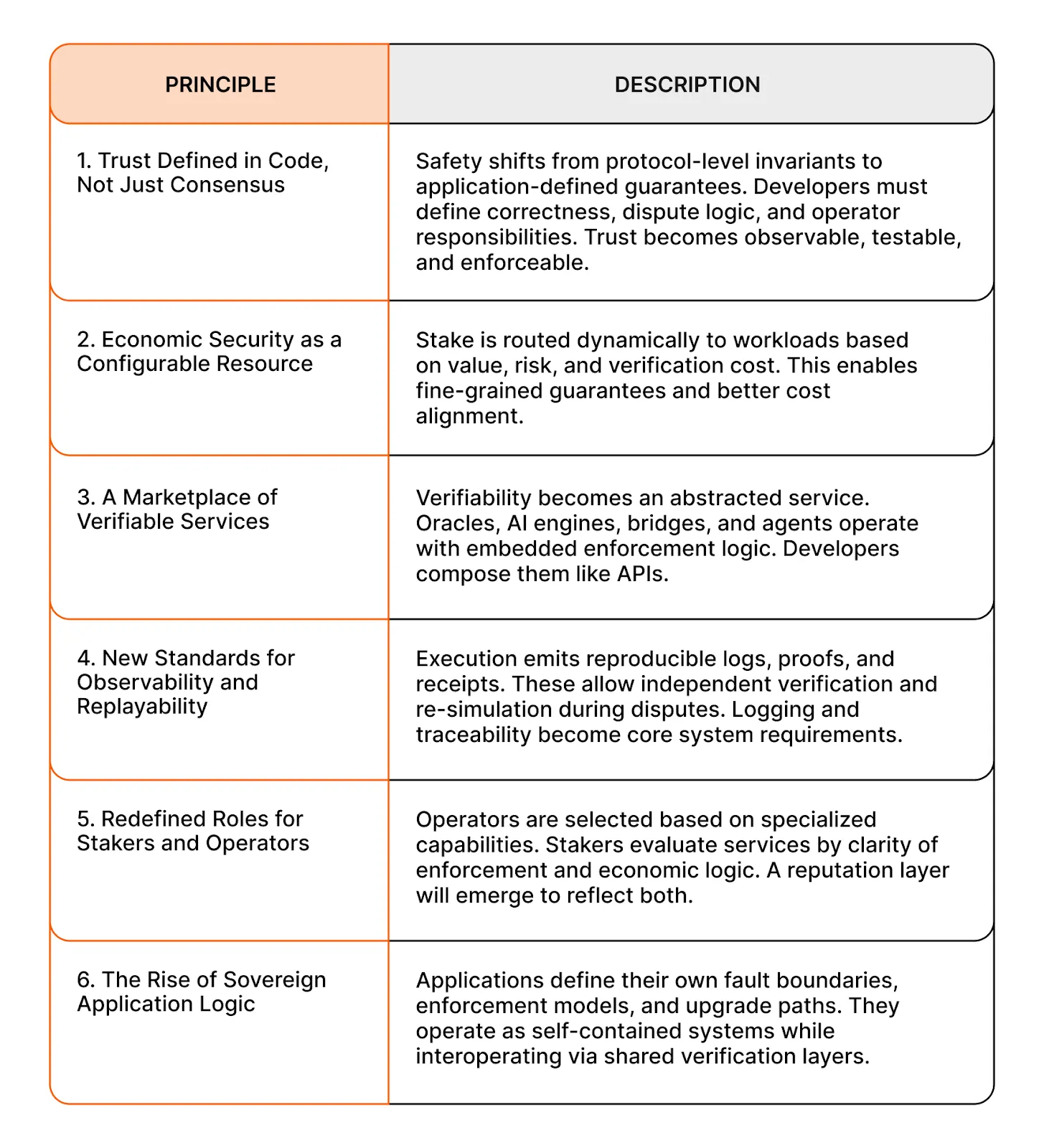A New Era of Programmable Trust
EigenCloud introduces a new execution model for Web3. Developers can now deploy containerized workloads with access to APIs, custom runtimes, and hardware acceleration while retaining cryptoeconomic guarantees.
Execution runs offchain. Verification and enforcement are preserved through the EigenCloud stack. Each task is registered through a verifiable delegation process, attested by operators, and backed by bonded stake. Outputs are recorded to EigenDA and can be proven, challenged, or escalated depending on the enforcement logic defined by the application.
The architecture supports programmable infrastructure with strong guarantees. Application developers define what constitutes correctness. EigenCloud ensures those rules can be enforced at runtime and validated post-execution.
Programmability becomes a platform capability when paired with verifiability.
Expanding the Trust Model
EigenCloud shifts the responsibility for enforcement from the protocol to the application layer. Autonomous Verifiable Services define their own rules for correctness, fault detection, and dispute handling.
AVS developers must specify:
- Valid and invalid output criteria
- How stake is allocated, bonded, and penalized
- Operator selection, attestation, and rotation logic
- Dispute initiation and resolution procedures
These specifications become part of the application’s design. They are enforced through mechanisms like slashing conditions, challenge-response flows, and resolution layers such as EigenVerify - a protocol-integrated framework for verifying offchain execution integrity, detecting faults, and resolving disputes through reproducible evidence and programmable slashing logic.
The infrastructure provides the enforcement engine. AVSs must define what gets enforced.
Verifiability at Scale
EigenCloud enables systems that require advanced logic, real-world data inputs, and scalable computation. Applications operate offchain but provide onchain guarantees.
Example use cases include:
AI and Agent Systems
Autonomous agents that execute tasks, hold assets, and interact with external services. Each action path is auditable and tied to cryptoeconomic enforcement.
Oracles and Coordination Systems
Services that pull external data, process it, and push verified results to chains. The integrity of results is backed by observable execution and slashing conditions.
Incentive Protocols and Games
Logic that enforces cooldowns, verifies user actions, or rewards real-world behavior. Verifiable randomness and offchain scoring can be incorporated through EigenDA and EigenVerify.
Enterprise and Financial Workflows
Complex logic executed offchain, attested by operators, and settled onchain. Structured data pipelines can be verified and enforced without compromising flexibility.
Each application defines its own enforcement logic. The EigenCloud stack ensures it can be executed reliably and verified by independent observers.
Designing for Verifiability
Building production-ready AVSs requires clarity across four operational surfaces:
Slashing Condition Design
Faults must be defined in measurable terms. Outputs should be verifiable against expected results. Conditions must be observable and executable through EigenVerify or operator attestations.
Stake Configuration
Stake should match risk exposure. AVS logic should account for delegation levels, operator distribution, and the impact of collusion or region-specific concentration.
Dispute Resolution
Each task type should align with a resolution strategy. Deterministic functions use re-execution. Judgment-based tasks rely on intersubjective consensus. Complex domains can use AI adjudication with fallback logic.
Logging and Attestation
Inputs, state transitions, and outputs must be recorded. Publishing this data to EigenDA enables reproducibility and supports long-term integrity checks.
These principles ensure that each AVS defines trust in a way that can be enforced and inspected across its lifecycle.
Execution at Scale
EigenCloud expands what applications can be built. Its growth depends on the quality of execution by teams building on it.
The EigenLayer ecosystem evolves through both supply and demand. More stake supports more AVSs. More AVSs create new application categories and attract broader adoption.
EigenCloud expands the demand surface by enabling new verifiable services. These include offchain computation, AI inference, data coordination, and dispute systems. Each service must be well-defined and enforceable to earn trust from operators and users.
EigenCompute plays a foundational role here. It provides high-performance compute environments that run containerized workloads offchain, using specialized hardware (like GPUs or TEEs) and any programming stack, while retaining verifiability through slashing-based enforcement and operator attestations.
Over the past two years, we’ve supported multiple large-scale efforts on EigenLayer, including the $2.5 million open challenge on slashing activation and red-team campaigns targeting AVS enforcement design. These engagements surfaced repeatable patterns in assumption mapping, dispute simulation, and operator safety that we now see informing how AVS teams approach EigenCloud.
The teams building on EigenCloud today are translating those ideas into practice. They are defining what trust means for programmable infrastructure and showing how it can be enforced at scale.
Their success defines the next stage of decentralized infrastructure. We’re proud to support it.
What Comes Next: The Future of Verifiable Infrastructure
The emergence of systems like EigenCloud signals a broader shift in how trust will be designed, enforced, and consumed across decentralized infrastructure.
For over a decade, blockchains focused on deterministic execution and consensus safety. But as more applications move into domains that require AI, data aggregation, hardware acceleration, and external coordination, the industry is outgrowing the limits of onchain logic.
What emerges next is a model where trust is modular, programmable, and composable across systems.
We anticipate several defining features of this next phase:

Build With Confidence
AVSs are defining the rules of correctness and proving that those rules hold under real-world conditions. The stack is modular, composable, and ready for teams that want to operate with clear, enforceable guarantees.
If you are designing an AVS, migrating application logic to EigenCloud, or defining new enforcement systems, we can help clarify assumptions and stress-test the challenging paths. Book a session with us.
Programmable infrastructure succeeds when it produces outcomes that can be measured and proven. Let’s build with that standard in mind.




